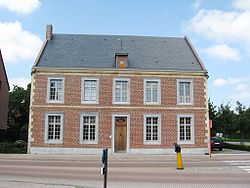
Treaty of Zonhoven
Encyclopedia

Zonhoven
Zonhoven is a municipality located in the Belgian province of Limburg near Hasselt. On January 1, 2007 Zonhoven had a total population of 20,060...
on November 18, 1833 between representatives of the United Kingdom of the Netherlands
United Kingdom of the Netherlands
United Kingdom of the Netherlands is the unofficial name used to refer to Kingdom of the Netherlands during the period after it was first created from part of the First French Empire and before the new kingdom of Belgium split out in 1830...
and Belgium
Belgium
Belgium , officially the Kingdom of Belgium, is a federal state in Western Europe. It is a founding member of the European Union and hosts the EU's headquarters, and those of several other major international organisations such as NATO.Belgium is also a member of, or affiliated to, many...
. The accord altered an agreement made during the Convention of London (May 21, 1833) whereby navigation of the Scheldt River and the Meuse River
Meuse River
The Maas or Meuse is a major European river, rising in France and flowing through Belgium and the Netherlands before draining into the North Sea...
would remain free and open. However, the convention did not establish a definitive treaty and Belgium owed dues to Holland for its use of the Scheldt River. As a result, the Treaty of Zonhoven established special regulations over the use of the Meuse River by the signatories. Overall, the accord helped to re-establish bilateral relations between the Netherlands and Belgium.
Source
- Adolphus William Ward and George Walter Prothero. The Cambridge Modern History. Cambridge: Cambridge University Press, 1907.

